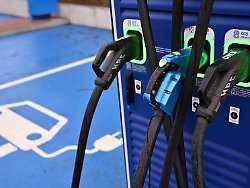Study does not believe in target mark
Wissing makes municipalities responsible for the expansion of the charging network
06/29/2022, 7:37 p.m
Significantly more charging stations are needed to encourage Germans to buy more e-cars. Federal Transport Minister Wissing is demanding more information from the municipalities about the expansion and greater investment. A study by management consultancy PwC does not believe it will be successful.
Federal Transport Minister Volker Wissing sees the municipalities as playing a key role in expanding the charging network for electric cars. The FDP politician said at a conference in Berlin that the construction of charging stations is not yet a sure-fire success. In more than half of the municipalities there is still not a single publicly accessible charging point. It can’t stay like this.
In the federal government’s new master plan for charging infrastructure, a focus should therefore be placed on the municipalities. These should be more involved. Municipalities should not only be supported financially, but also with information, training and planning for the regional charging infrastructure. The number of e-cars in Germany has risen sharply in recent years. However, there is still a long way to go before the federal government’s goal of 15 million of them being on the road by 2030. E-cars play a key role in achieving climate goals. CO2 emissions from traffic have hardly fallen in recent years.
Study predicts far too few charging stations
According to management consultancy PwC, the announced mark will clearly be missed. In its current study, the consultancy writes: “Germany will clearly miss the target of 15 million registered electric cars by 2030 and will only put 10.5 million electric vehicles on the road.” Even for these 10.5 million, at least 340,000 public fast charging points would be needed. “At the current pace, however, only 210,000 will be reached.”
Wissing said many people still had major reservations about charging and therefore decided against switching to an electric vehicle. “My goal is that no one in Germany decides against buying an electric vehicle because they can’t trust that there are enough reliable and convenient charging options.” Anyone who wants to invest in charging infrastructure should be able to do so more quickly and easily. “The more investments we encourage, the more charging points there are and the more competition we create.”
Federal association misses bidirectional loading
According to the PwC experts, accelerating grid expansion would also require less bureaucracy, more space and more incentives for the construction and operation of the charging infrastructure. In addition, there must be more affordable all-electric models with a good range that are fit for fast charging, said Heiko Seitz, co-author of the study and Head of Electromobility at PwC Germany.
The Federal Association for E-Mobility criticized the master plan, which is in the works. Bidirectional loading is not considered at all. Charging stations could thus make an important contribution to the energy transition and contribute to energy security. With bidirectional charging, e-cars can be integrated into the house or into the power grid as a kind of mobile storage device.
